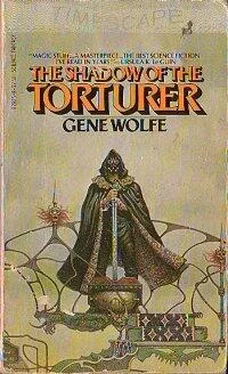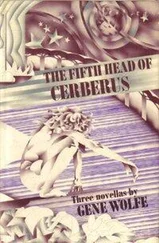(In the end he said nothing. Torturers do not go to the Tower of Healing, no matter how ill; there is a belief—whether true or not I cannot say—that old scores are settled there.)
If I were writing this history to entertain or even to instruct, I would not digress here to discuss Master Malrubius, who must, at the moment when I thrust away the Claw, have been dust for long years. But in a history, as in other things, there are necessities and necessities. I know little of literary style; but I have learned as I have progressed, and find this art not so much different from my old one as might be thought.
Many scores and sometimes many hundreds of persons come to watch an execution, and I have seen balconies torn from their walls by the weight of the watchers, killing more in their single crash than I in my career. These scores and hundreds may be linkened to the readers of a written account. But there are others besides these spectators who must be satisfied: the authority in whose name the carnifex acts; those who have given him money so that the condemned may have an easy (or a hard) death; and the carnifex himself. The spectators will be content if there are no long delays, if the condemned is permitted to speak briefly and does it well, if the upraised blade gleams in the sun for a moment before it descends, thus giving them time to catch breath and nudge one another, and if the head falls with a satisfactory gout of blood. Similarly you, who will some day delve in Master Ultan’s library, will require of me no long delays; personages who are permitted to speak only briefly yet do it well; certain dramatic pauses which shall signal to you that something of import is about to occur; excitement; and a sating quantity of blood. The authorities for whom the carnifex acts, the chiliarchs or archons (if I may be permitted to prolong my figure of speech), will have little complaint if the condemned is prevented from escaping, or much inflaming the mob; and if he is undeniably dead at the conclusion of the proceedings. That authority, as it seems to me, in my writing is the impulse that drives me to my task. Its requirements are that the subject of this work must remain central to it—not escaping into prefaces or indexes or into another work entirely; that the rhetoric not be permitted to overwhelm it; and that it be carried to a satisfactory conclusion.
Those who have paid the carnifex to make the act a painless or a painful one may be likened to the literary traditions and accepted models to which I am compelled to bow. I recall that one winter day, when cold rain beat against the window of the room where he gave us our lessons, Master Malrubius—perhaps because he saw we were too dispirited for serious work, perhaps only because he was dispirited himself—told us of a certain Master Werenfrid of our guild who in olden times, being in grave need, accepted remuneration from the enemies of the condemned and from his friends as well; and who by stationing one party on the right of the block and the other on the left, by his great skill made it appear to each that the result was entirely satisfactory. In just this way, the contending parties of tradition pull at the writers of histories. Yes, even at autarchs. One desires ease; the other, richness of experience in the execution… of the writing. And I must try, in the dilemma of Master Werenfrid but lacking his abilities, to satisfy each. This I have attempted to do. There remains the carnifex himself; I am he. It is not enough for him to earn praise from all. It is not enough, even, for him to perform his function in a way he knows to be entirely creditable and in keeping with the teaching of his masters and the ancient traditions. In addition to all this, if he is to feel full satisfaction at the moment when Time lifts his own severed head by the hair, he must add to the execution some feature however small that is entirely his own and that he will never repeat. Only thus can he feel himself a free artist.
When I shared a bed with Baldanders, I dreamed a strange dream; and in composing this history I did not hesitate to relate it, the relation of dreams being entirely in the literary tradition. At the time I write of now, when Dorcas and I slept under the stars with Baldanders and Jolenta, and Dr. Talos sat by, I experienced what may have been less or greater than a dream; and that is outside that tradition. I give warning to you who will later read this that it has little bearing on what will soon follow; I give it only because it puzzled me at the time and it will provide me with satisfaction to relate it. Yet it may be that insofar as it entered my mind and has remained there from that time to this, it affected my actions during the latter part of my narrative. With the Claw safely hidden away, I lay stretched on an old blanket near the fire. Dorcas lay with her head near mine; Jolenta with her feet to mine; Baldanders on his back on the opposite side of the fire, his thick-soled boots among the embers. Dr. Talos’s chair stood near the giant’s hand, but it was turned away from the fire. Whether or not he did sit in it with his face to the night I cannot say; for parts of the time I am going to relate I seemed conscious of his presence in the chair, at other times I sensed that he was absent. The sky was growing lighter, I believe, than it is at full dark. Footfalls reached my ears yet hardly disturbed my rest, heavy, yet softly pattering; then the sound of breath, the snuffling of an animal. If I was awake, my eyes were open; but I was still so nearly in sleep that I did not turn my head. The animal approached me and sniffed at my clothes and my face. It was Triskele, and Triskele lay down with his spine pressed against my body. It did not seem odd then that he had found me, though I recall feeling a certain pleasure at seeing him again.
Once more I heard footsteps, now the slow, firm tread of a man; I knew at once that it was Master Malrubius—I could recall his step in the corridors under the tower on the days when we made the rounds of the cells; the sound was the same. He came into the circle of my vision. His cloak was dusty, as it always was save on the most formal occasions; he drew it about him in the old way as he seated himself on a box of properties. “Severian. Name for me the seven principles of governance.”
It was an effort for me to speak, but I managed (in my dream, if it was a dream) to say, “I do not recall that we have studied such a thing, Master.”
“You were always the most careless of my boys,” he told me, and fell silent. A foreboding grew on me; I sensed that if I did not reply, some tragedy would occur. At last I began weakly, “Anarchy…”
“That is not governance, but the lack of it. I taught you that it precedes all governance. Now list the seven sorts.”
“Attachment to the person of the monarch. Attachment to a bloodline or other sequence of succession. Attachment to the royal state. Attachment to a code legitimizing the governing state. Attachment to the law only. Attachment to a greater or lesser board of electors, as framers of the law. Attachment to an abstraction conceived as including the body of electors, other bodies giving rise to them, and numerous other elements, largely ideal.”
“Tolerable. Of these, which is the earliest form, and which the highest?”
“The development is in the order given, Master,” I said. “But I do not recall that you ever asked before which was highest?’
Master Malrubius leaned forward, his eyes burning brighter than the coals of the fire. “Which is highest, Severian?”
“The last, Master?”
“You mean attachment to an abstraction conceived as including the body of electors, other bodies giving rise to them, and numerous other elements, largely ideal?”
“Yes, Master.”
“Of what kind, Severian, is your own attachment to the Divine Entity?” I said nothing. It may have been that I was thinking; but if so, my mind was too much filled with sleep to be conscious of its thought. Instead, I became profoundly aware of my physical surroundings. The sky above my face in all its grandeur seemed to have been made solely for my benefit, and to be presented for my inspection now. I lay upon the ground as upon a woman, and the very air that surrounded me seemed a thing as admirable as crystal and as fluid as wine. “Answer me, Severian.”
Читать дальше










